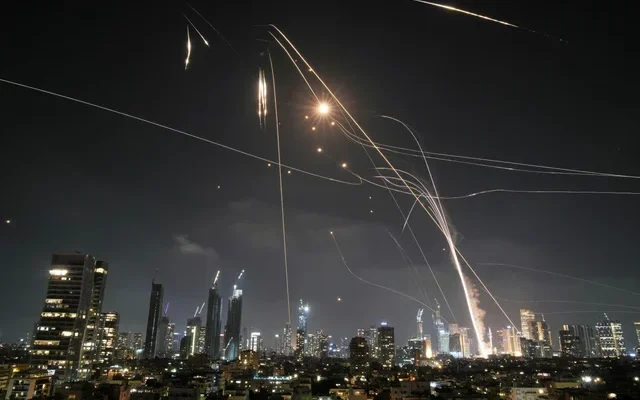
Warning sirens sounded across Israel on Friday as Iran fired dozens of ballistic missiles in a retaliatory attack after Israel launched overnight airstrikes. A second round of missiles targeted Israel a few hours later. Some made it through Israel’s missile defense system, causing damage and injuries, though the full extent of the damage is not yet clear.
A little after 4:30 a.m. Saturday local time, the Israel Defense Forces wrote on social media that “Israelis are currently running for shelter in northern Israel as sirens sound due to another missile launch from Iran.” It was not immediately clear if this marked a third round of missiles or was still part of the second wave.

In the first round, about 100 missiles were fired from Iran in two salvos, officials said. Israel has a robust missile defense system known as the Iron Dome, which intercepted most of the missiles, the IDF said. The IDF reported a limited number of hits on structures, some from interception failures.
Video and photos show a number of buildings damaged or on fire. The IDF reported that 21 people had been injured and two were in serious condition.
Dozens more missiles came in the next wave, and again the IDF said some, but not all, were intercepted. “Search and Rescue forces are currently operating in a number of locations across the country in which reports of fallen projectiles were received,” the military said.

Fire and smoke rises from a destroyed building that was hit by a missile fired from Iran, in Tel Aviv, Israel on Friday, June 13, 2025. (AP Photo/Tomer Appelbaum)
A U.S. official and a White House official confirmed to CBS News that the United States helped Israel intercept Iranian missiles.
During the strikes, U.S. troops at two bases in the Middle East were ordered into bunkers. Troops at Union III in the Green Zone in Baghdad, Iraq, and Al-Tanf Garrison in Syria spent about an hour in the bunkers, CBS News confirmed.

The retaliatory action from Iran came after Israel launched over 200 airstrikes on Iran, continuing a major operation that began overnight, IDF spokesman Brig. Gen. Effie Defrin said Friday. Israel’s airstrikes are continuing, Defrin said. https://bce6e962bce80dbbe3e2203ad1f3069e.safeframe.googlesyndication.com/safeframe/1-0-45/html/container.html?n=0
Iran’s U.N. ambassador said Friday that 78 people were killed and more than 320 were injured in Israeli attacks.
Israel first launched airstrikes on Iran early Friday and announced its operation was targeting Iranian nuclear facilities, scientists and senior military commanders.
Tehran responded by launching more than 100 drones at Israel on Friday morning, Israel’s military said. Defrin said earlier Friday that Israel’s air defenses had worked to “intercept the threats.” Later Friday, an Israeli military official told reporters that while the threat wasn’t over, Israel had managed to intercept many of Iran’s UAVs.
“Throughout the day, we once again demonstrated our ability to remove threats in a coordinated, precise and daring manner,” Defrin said Friday night local time.
In a televised statement on Friday, Supreme Leader Ayatollah Ali Khamenei said the Iranian Armed Forces would respond fiercely to the strikes and leave Israel “helpless.” https://bce6e962bce80dbbe3e2203ad1f3069e.safeframe.googlesyndication.com/safeframe/1-0-45/html/container.html?n=0
Shortly after the statement, the IDF confirmed that its fighter jets had “completed a strike on the Iranian regime’s nuclear site in the Isfahan area.” Ishafan is in central Iran. The strike “dismantled a facility for producing metallic uranium, infrastructure for reconverting enriched uranium, laboratories and additional infrastructure,” the IDF said.
U.S. not involved in Israel’s strikes, Rubio says
The U.S. was not involved in Israel’s strikes, Secretary of State Marco Rubio said, adding a warning that “Iran should not target U.S. interests or personnel.”
The State Department informed multiple U.S.-allied governments in the region Thursday in advance of the Israeli strikes and intelligence operations in Iran, four sources told CBS News. Rubio personally reached out to a number of them, sources said.
The main message conveyed by the Trump administration in those messages was that this was not a U.S. operation and did not involve U.S. assets, and that the U.S. preferred diplomacy to military force.
President Trump said in a post Friday morning on his Truth Social platform that he had given Iran “chance after chance” to make a deal with the U.S. on its nuclear program, but that despite his warnings to Tehran that the alternative would be “much worse” than anything seen before, “they just couldn’t get it done.”
